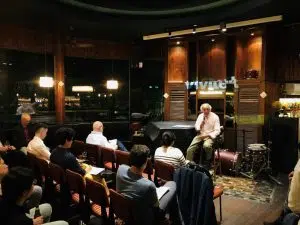On Thursday, 13 June 2019 – ESSCA School of Management – Shanghai Campus and China Crossroads organized a research seminar entitled ‘Europe, China and Systemic Rivalry’ in Shanghai. Focusing on cooperation between the European Union (EU) and the People’s Republic of China (China), especially in light of the deteriorating Sino-American relations, the talk reviewed the EU’s Connectivity Strategy with Asia. This talk was conducted in two segments with presentation and discussion. Mr. Xavier NUTTIN was the keynote speaker, who is the Senior Associate at European Institute of Asian Studies (EIAS), and Former Senior Asian Analyst in European Parliament.
With ratcheting up tension between China and the United States (US), the increased instability impacts businesses around the world. Though the battle for supremacy is still ongoing, the balance of power is already shifting. The EU does not escape this situation and has (finally some observers would say) reflected on new policies to address the consequences of China’s ambition to become a leading global power. While remaining committed to a comprehensive strategic partnership with Beijing, the EU now considers China as a systemic rival promoting alternative models of governance that are not always aligned with the EU’s interests and values. The Belt and Road Initiative is an example where the Chinese and the European ways fundamentally diverge.
In the presentation, Mr. NUTTIN highlighted Europe’s priorities as defined in the 10 point action plan entitled ‘EU-China – A Strategic Outlook’.Nuttin pointed out that the document does not exclusively cover Chinese issues but also covers the need to reform internal EU policies such as the industrial base or FDI in Europe. It regards China as ‘a cooperation partner’, ‘an economic competitor’ and ‘a systemic rival’, which in turn highlights that the EU will defend her interests stronger than before. Mr. NUTTIN also described that the unity of the EU and the (lack of) trust in cooperation with China are the most important issues right now.
As regards the trade war, Mr. NUTTIN gave a brief introduction about the situation of the EU and the relationship with the US and China. He emphasised that the EU should find a way to protect itself and benefit from the complicated tripartite co-opetition.
Next, he shared the insights on what is the strategy to improve the connectivity between the EU and Asia emphasizing the differences between the Chinese and the European governance model.
In the end, the ensuing discussion was guided by questions such as what leverage does the EU has and whether the ‘West’ sometimes ‘gives away’ strategic thinking by contiuously deliberating about its relations with other global actors.
About Speaker

[cite]





